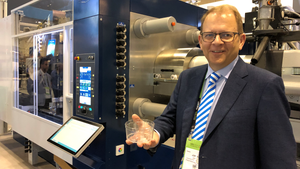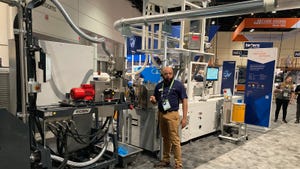Don’t let pushback knock you off the path to scientific molding
The most difficult aspect of scientific injection molding isn't really what you might expect. Some folks might guess the biggest challenge to overcome is tooling design or machine repeatability, but, in my opinion, it is something much simpler: pushback.
June 19, 2012
"Pushback" is, simply put, the resistance that the old guard, or those that just don't quite understand the process, will put up during scientific molding implementation. It is difficult for people that have been in the industry for a long time to come to terms with the fact that they have been doing it wrong. That's why it's important to keep in mind that at some point and time, we were all doing it wrong, including myself.
Whether it is pride or just the belief that these theories won't work, this pushback is still alive and well in our industry. Remember that you are trying to change culture and habits that have been in place for years. Typically the pushback comes from supporting departments but it is absolutely not isolated to them. After so many years of trial and error you might think that everyone has adopted these principles but facts are facts and it just isn't so.
Out of those who are attempting to process scientifically, several molders are still making drastic compromises to the process instead of making the necessary changes to run robust processes. I will admit there are times when this is an absolute necessity, but when those compromises become the rule and not the exception is when problems arise.
The task that you are charged with is extremely important to the success of the business, and it can get frustrating at times. I have personally been through this with several companies, and I have seen how successful it can be when everyone has finally seen the proverbial light and full buy in has been gained.
I have also seen what happens when the message has not been received, and success has been snatched out of your hands. What I have learned throughout this process is that everyone needs to be trained in scientific injection molding not just those that are responsible for the process development or maintaining the process.
John Bozzelli offers several courses that are directed at specific job functions, including management, and RJG also provides executive overviews for upper management. I would recommend getting everyone involved to some extent, including quality engineers and managers, sales and customer service, toolmakers and engineers, maintenance techs, and project and manufacturing engineers.
Don't forget to educate your customers
The more all parties understand why we are doing what we are doing, the easier it will be and the less pushback you will receive. The group that is often forgotten more than any other in this challenge to share the knowledge is an important one: your customers. Educating your customers on the principles of scientific injection molding is absolutely key if you want to have a successful partnership with them. Imagine your customers having a better understanding of what you are trying to accomplish. Ultimately the customer is the one that benefits the most from true robust process development.
I know for a fact that educating the customer is something that has not been focused on enough in our industry. There is evidence enough considering that some customers still require molders to validate process settings as part of the validation process. How do you accomplish this task? Well there are several ways.
The first, which is fairly straight forward, is you can always give an expert like John Bozzelli a call and hire him to do some consulting and provide a presentation for your customers. Your customers may see a third-party expert as someone that doesn't have a personal stake in the success of the business.
Another way to spread the knowledge to your customers would be to invite them to your facility and give them a full presentation of your own. As part of this presentation, I would recommend making it completely clear that this is an invitation to work together as a team to improve quality levels through robust process development. Convey the message that it will absolutely take efforts from both companies to reach your goals. I have gone through this exercise with several customers, and its has always been extremely positive and truly helpful in transitioning to scientific process development.
Implementation of scientific injection molding can be a difficult path filled with various roadblocks and challenges. The best bet for success lies in educating the team around you and focusing on a common goal of robust, repeatable processes producing high-quality product.
About the Author: Robert P. Gattshall has worked 17 years in the automotive and medical injection molding industries, including 12 years in process engineering and process development. Certified in John Bozzelli's Scientific Injection Molding for more than 10 years, Gattshall has developed more than 600 processes using scientific injection molding principles. Certified in Lean 5S and SMED, Gattshall has also trained more than 50 process technicians and engineers on the principles of decoupled molding.
About the Author(s)
You May Also Like


